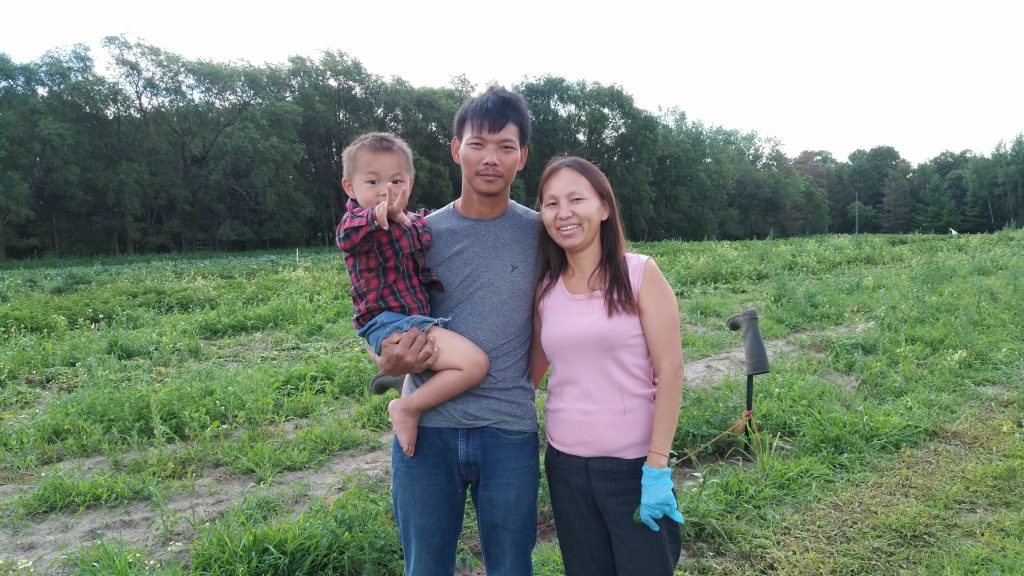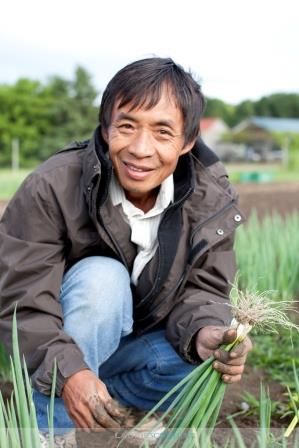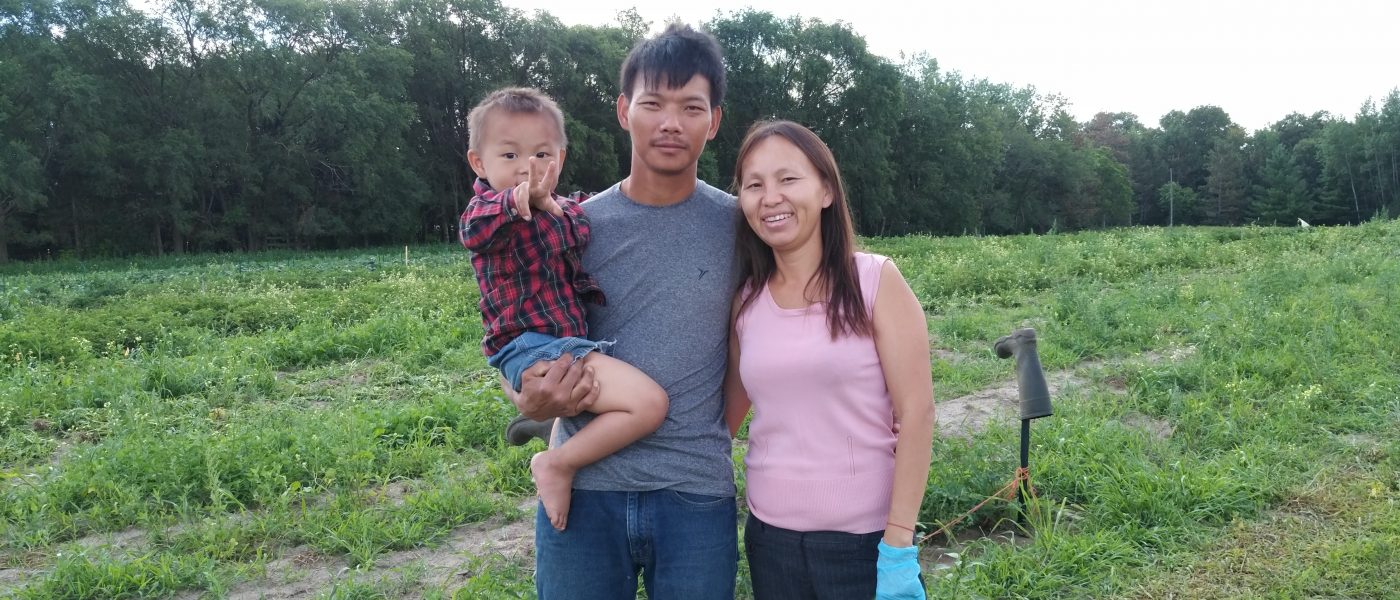Farm Aid partners with organizations all over the country to work towards our mission of creating a family farm-centered system of agriculture in America. Since our first concert in 1985, we’ve granted over $24 million to more than 300 organizations, creating a strong network of allies to keep family farmers on the land. Each year, grantees report back on what they’ve accomplished.
This post features two stories from The Minnesota Food Association who is working with refugee farmers.
We’ve condensed and edited each statement for clarity, but the following are our grantees’ own stories in their words. We hope you’ll be as inspired as we were by the uplifting work that’s happening all over our country.
Choua and Xou
The Minnesota Food Association (MFA), a program of The Food Group, works to support, educate, and help beginning organic farmers thrive. One of the ways that they accomplish this goal is through their Farmer Education Program, which serves historically underrepresented farmers (immigrants, people of color, women, refugees).

Choua and Xou: Transitioning to Organic Farming
Choua, a teacher with the Hmong Charter School in St. Paul, looks forward to planting season in spring time each year. She and her husband, Xou, found out about MFA through the Hmong American Partnership (HAP) at a workshop in 2016, and in 2017 enrolled in the Organic Transitions program.
Before connecting with MFA, Choua and Xou had already started their own farming business. With four little boys to support, they needed a way to supplement their income and save up for their children’s education. Although the most experience Choua had with planting was in her mother’s garden, Xou seemed to have a knack for farming.
In 2014, Choua and Xou found a 3-acre plot to rent in Marine on St. Croix, Minnesota with a group of Hmong farmers. After a year there, they moved their start-up operation to Vermillion, south of the Twin Cities. Both locations had poor soil health as a result of having been farmed for many consecutive years, so Choua and Xou continued to look for a better fit.
In 2016, they found a 6-acre plot of land to rent on a farm near Forest Lake. They formed a great relationship with their landlord, a retired farmer who became a mentor for Xou on basic tractor skills. Little by little, Choua and Xou discovered how to navigate their business partnership – Choua became responsible for all paperwork and communication, and Xou the lead on field work and equipment. They found farmers markets in Brooklyn Park and Pine City to sell their produce, and customer demand continued to grow.
However, they worried about the side effects of working with chemical-based fertilizers. When they found out they could learn organic farming methods through MFA, they decided to give it a try.
In their first year of the program, Choua attended classes to learn about the record-keeping and farming practices they needed to become certified organic. In 2018, the couple left their plot in Forest Lake to farm land at MFA. There, Xou had more access to mentors who knew the details of organic farming, and they started putting what they had learned to practice.
Choua and Xou currently grow on 4 acres plus cover crop at MFA, and focus on cucumbers, zucchini, onions, bitter ball, tomato, eggplant, pepper, and ground cherries. They are hoping to become certified organic for the first time in 2019. They continue to sell at farmers markets in Brooklyn Park and Pine City and are working on developing new wholesale markets through The Good Acre food hub.
Choua and Xou are hoping to scale up their farming business, and with their own organic certification, open up new market opportunities. Within the next 3 to 5 years, they hope to buy farmland with a house where they can raise their family and support themselves off the farm.
The Karen Family Farm

Aung Thin
You can tell by his smile that Aung Thin of Karen Family Farm is living out his dream. “I want to be a happy old farmer,” he grins, “and change people’s minds to show them that you can be happy.”
His radiant happiness has not stemmed from a life of ease; Aung Thin has been faced with perpetual challenges ever since he was a child in Burma. When he was only 8-years-old, Aung Thin’s father left his mother to raise her four children alone. “When I was 15, the Karen and Burmese were fighting,” recalls Aung Thin. Around that time, his eldest brother died from contracting malaria while working as an army transport in the jungle and his sister died not long after.
At 19 Aung Thin married his wife. “I had land from my grandparents,” he recalls, “about five acres. We used cows to till the ground for rice.” Despite farming, food was scarce. “At the end of the year, it didn’t matter how much you harvested, you had to give it all to the government. You didn’t have anything to eat. You didn’t have extra food.”
There were other dangers as well, “We would worry about infections,” he explains, “and poisonous snakes. If a cobra bit you, you would die. If someone contracted malaria, there was no medicine, you would get sick, go crazy, and die. Everything was getting hard.”
“I am a happy farmer. Fresh vegetables make me happy.”
Things became so difficult that Aung Thin decided to leave his family and live on the border of Thailand and Burma. “I heard if you carried things over the border you could make money,” he says. For one year, he carried supplies through the jungle from Thailand to Burma: shoes, clothes, food. “Sometimes I carried things a really long way, and sometimes it was really heavy,” says Aung Thin. He carried the goods in a large basket on his back. “If I would have had a car, the Burmese army would have heard it and found me.” Aung Thin worked on the border until the Burmese soldiers invaded the village where he lived. “I couldn’t carry things anymore, so I moved to a Thailand refugee camp,” he explains.
“The first camp was close to the Burmese army, so we moved to another camp,” he recalls, “but not long after, the Burmese came to shoot and burn the camp.” Entering and exiting the first two refugee camps was easy, but in the final camp, located much further into Thailand, it was more difficult. “The third camp was hard, there was not enough food. We had to buy everything, but there was no money,” says Aung Thin. During the night, Aung Thin would sneak past the Thai soldiers guarding the camp walls to work outside and bring back money. “I was arrested two times for leaving the camp to work,” he explains. “I was not a Thai citizen, so I wasn’t allowed to do anything other than stay in the camp.”
After years of living as a refugee, Aung Thin moved to Arizona with his family once a resettlement program opened up in the U.S. in 2008. “It was really hard,” he says. “I had a case manager for five months, but after that, I had to stand by myself, which was very hard in a new country.” He struggled to keep a job. “I worked in a laundromat, but was fired after two days,” he recalls, for not working fast enough. He tried to apply for new jobs, but no one would hire him. “My case manager told me after five years it will get better – your kids will learn English, and then they can help you.” After support from his case manager ended, Aung Thin moved his family to Minnesota, where his remaining sister had been resettled.
In Minnesota, Aung Thin found a job cutting and packing meat, and later worked cleaning at the Hmong Market in St. Paul. There was better support than in Arizona, and Aung Thin found a community of Karen people at the Karen Organization of Minnesota (KOM). At that time, KOM had a grant partnership with MFA. Through the grant, MFA hired five Karen people part time to help with farm work, and they were each given ¼ acre to farm on their own. Aung Thin returned year after year, and when the grant ended in 2014, he continued farming independently at MFA.
“At MFA I have learned how to plant evenly, and how to grow good plants,” reflects Aung Thin. He’s also learned which crops are good for market and which crops store well. Now in the Whole Farm Management program, he hopes to “learn about how to use the tractor to do plowing, and how to make the soil new again when it gets old.”
Aung Thin thanks God and the U.S. government for helping him move here and be able to work as a farmer. Before coming to the U.S., “I thought that there was no land,” recalls Aung Thin. “When I was a teenager, a lady told me that in the U.S. you couldn’t see the earth – it is all big city, with tall buildings.” After moving to Minnesota and having the chance to be a farmer, though, “I am very happy,” he says. “I am a happy farmer. Fresh vegetables make me happy.” He attributes his good health to farming as well. Since he started farming in 2011, “I’ve never been sick,” he says.
Eventually, Aung Thin hopes to own his own farm in Minnesota, where he can rent plots of land to other Karen refugees and teach them what he has learned. “If I can have my own land, it will be good. I want to pass it on and be a role model for my kids and other teenagers,” he says. “Some people work in big companies, and when they are old, they are not happy.”



